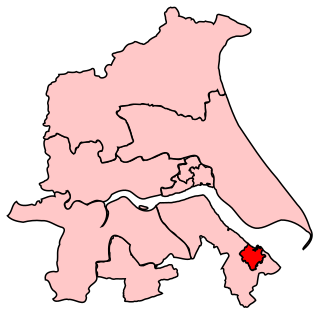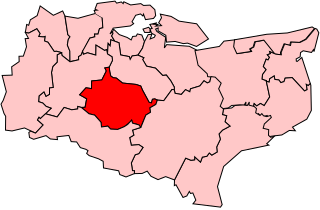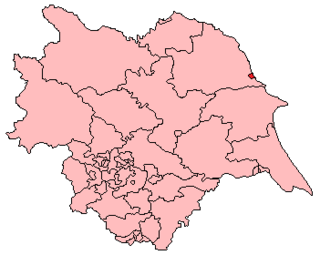
City of Durham is a constituency represented in the House of Commons of the UK Parliament since 2019 by Mary Foy of the Labour Party.

Great Grimsby is a constituency in North East Lincolnshire represented in the House of Commons of the Parliament of the United Kingdom since December 2019 by Lia Nici of the Conservative Party. Between 1918 and 1983 it was known simply as Grimsby; following the 2023 Periodic Review of Westminster constituencies, the seat will be subject to boundary changes which will incorporate the neighbouring town of Cleethorpes. As a consequence, it will be renamed Great Grimsby and Cleethorpes, to be first contested at the next general election.

Bedford is a constituency represented in the House of Commons of the UK Parliament since 2017 by Mohammad Yasin of the Labour Party.

Maidstone was a parliamentary constituency represented in the House of Commons of the Parliament of the United Kingdom.

Lancaster was a constituency of the House of Commons of the Parliament of England then of the Parliament of Great Britain from 1707 to 1800 and of the Parliament of the United Kingdom from 1801 to 1867, centred on the historic city of Lancaster in north-west England. It was represented by two Members of Parliament until the constituency was disenfranchised for corruption in 1867.

Maldon is a constituency in Essex represented in the House of Commons of the UK Parliament since its recreation in 2010 by Sir John Whittingdale, a Conservative.
Bewdley was the name of a constituency of the House of Commons of the Parliament of the United Kingdom from 1605 until 1950. Until 1885 it was a parliamentary borough in Worcestershire, represented by one Member of Parliament; the name was then transferred to a county constituency from 1885 until 1950. Its MPs included the former Prime Minister Stanley Baldwin, who represented the seat from 1908 to 1937, and afterwards took the name of the constituency as part of his title when he was raised to the peerage.

Beverley has been the name of a parliamentary constituency in the East Riding of Yorkshire for three periods. From medieval times until 1869 it was a parliamentary borough consisting of a limited electorate of property owners of its early designated borders within the market town of Beverley, which returned (elected) two Members of Parliament to the House of Commons of the English and Welsh-turned-UK Parliament during that period.

Clitheroe was a parliamentary constituency in Lancashire.
Liverpool was a borough constituency in the county of Lancashire of the House of Commons for the Parliament of England to 1706 then of the Parliament of Great Britain from 1707 to 1800 and of the Parliament of the United Kingdom from 1801 to 1885. It was represented by two Members of Parliament (MPs). In 1868, this was increased to three Members of Parliament.

Scarborough was the name of a constituency in Yorkshire, electing Members of Parliament to the House of Commons, at two periods. From 1295 until 1918 it was a parliamentary borough consisting only of the town of Scarborough, electing two MPs until 1885 and one from 1885 until 1918. In 1974 the name was revived for a county constituency, covering a much wider area; this constituency was abolished in 1997.
Rye was a parliamentary constituency centred on the town of Rye in East Sussex. It returned two Members of Parliament to the House of Commons of the Parliament of the United Kingdom until its representation was halved under the Reform Act 1832.
Cricklade was a parliamentary constituency named after the town of Cricklade in Wiltshire.
Northallerton was a parliamentary borough in the North Riding of Yorkshire, represented by two Members of Parliament in the House of Commons briefly in the 13th century and again from 1640 to 1832, and by one member from 1832 until 1885.
Kingston upon Hull, often simply referred to as Hull, was a parliamentary constituency in Yorkshire, electing two members of parliament to the Parliaments of England, Great Britain and House of Commons of the Parliament of the United Kingdom, from 1305 until 1885. Its MPs included the anti-slavery campaigner, William Wilberforce, and the poet Andrew Marvell.
Launceston, also known at some periods as Dunheved, was a parliamentary constituency in Cornwall which returned two Members of Parliament to the British House of Commons from 1295 until 1832, and one member from 1832 until 1918. It was a parliamentary borough until 1885, and a county constituency thereafter.
Great Marlow, sometimes simply called Marlow, was a parliamentary borough in Buckinghamshire. It elected two Members of Parliament (MPs) to the House of Commons of England between 1301 and 1307, and again from 1624 until 1707, then in the House of Commons of Great Britain from 1707 to 1800 and finally in the House of Commons of the United Kingdom from 1801 to 1868. It elected one member from 1868 until 1885, when the borough was abolished.
Sandwich was a parliamentary constituency in Kent, which elected two Members of Parliament (MPs) to the House of Commons from 1366 until 1885, when it was disfranchised for corruption.
Brecon was a parliamentary constituency in Wales which returned one Member of Parliament (MP) to the House of Commons of the Parliament of the United Kingdom and its predecessors, from 1542 until it was abolished for the 1885 general election.
Thomas Parry was a British Liberal Party politician from Sleaford in Lincolnshire. He sat in the House of Commons for three short periods between 1865 and 1874.












